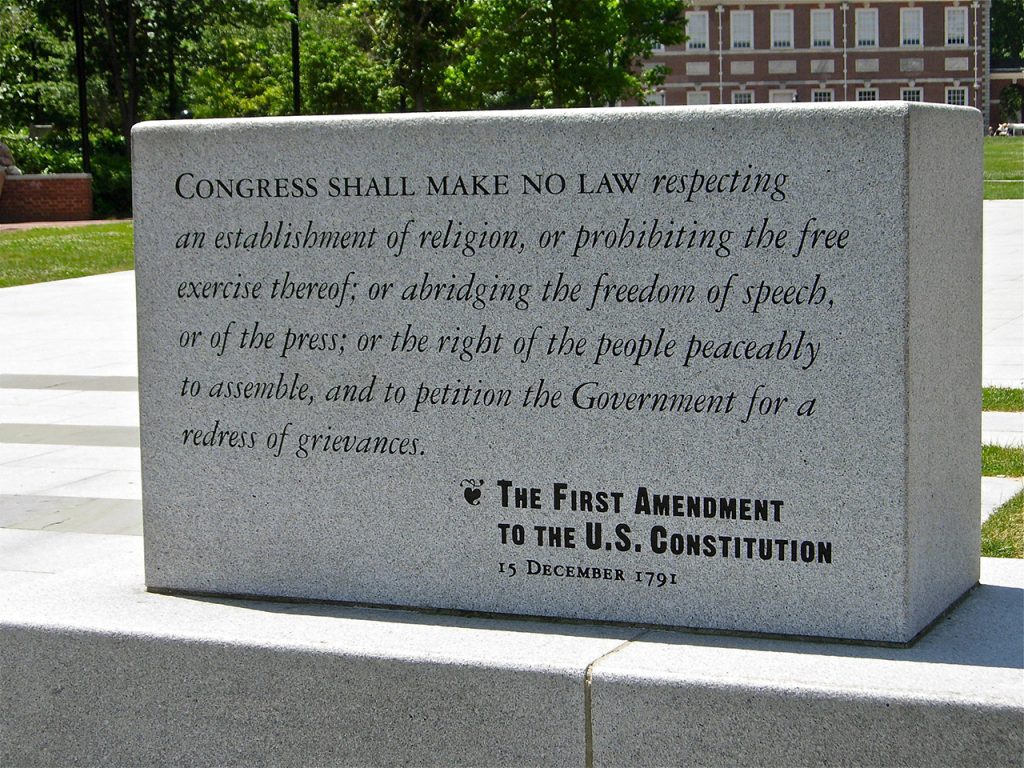The First Amendment Faces Tests Amid Black Lives Matter Protests, Insurrection
Two constitutional scholars talk about how freedom of speech and the right of assembly can be enforced unequally in America.

As part of 101.9 WDET’s Book Club, we’re inviting the Detroit region to examine and discuss the text that impacts every resident of the United States: The Constitution. Whether you’re revisiting the documents or reading them for the first time, join us in reading along and engaging in civil conversations with your community.
The freedoms of religion, speech, press and protest are right at the top of the Bill of Rights in the U.S. Constitution. And to this day, they are most likely the freedoms we cherish most as a nation. The ability to practice our religion of choice, to express ourselves and our political views out in the open, and to hold public officials accountable are all cornerstones of American life. But interpreting that amendment and putting into practice in real life is not without challenges.
“It’s pretty plain that over the lifespan of the First Amendment, you can probably count on maybe one or two hands the number of years where we really saw a strong effort to provide First Amendment freedoms equally on in regards to race.” –Justin Hansford, Howard University School of Law
As the WDET Book Club continues its discussion about the U.S. Constitution and the ways in which it has shaped our nation and our lives, Detroit Today explores the limits of the First Amendment in practical terms, and how it has affected equality and inequality in America over 230 years.
Listen: Legal scholars discuss the role of the First Amendment in advancing and hindering equality in America.
Guests
Leonard M. Niehoff is a professor from practice at the University of Michigan Law School and a nationally recognized expert and scholar on First Amendment law.
“When we look at protest, the picture becomes complicated because protests involve not just speech, but they involve conduct,” Niehoff points out. “And conduct obviously poses challenges, problems, complexities, that speech alone may not pose. And so the doctrine that has evolved to try to address the complexities of protest is sort of a thing unto itself.”
“I think that, historically, the First Amendment has been a powerful weapon in the arsenal of equality,” he continues. “It’s been used to enforce the right to protest to engage in dissent to criticize the existing order to promote political change and progress. I think that the violence used by Southern law enforcement against protesters in the 1960s tells us something important, which is that the pro-segregation forces feared the power of speech. But it’s also true that the First Amendment has been used as a weapon against equality. It’s been held to protect virulent forms of racist speech and association. It has a tendency to empower those who are already in power and to perpetuate institutions that already exist.”
“Historically, the First Amendment has been a powerful weapon in the arsenal of equality.” –Leonard Niehoff, University of Michigan Law School
Justin Hansford is a professor with Howard University School of Law and founder and executive director of the Thurgood Marshall Civil Rights Center.
“It’s pretty plain that over the lifespan of the First Amendment, you can probably count on maybe one or two hands the number of years where we really saw a strong effort to provide First Amendment freedoms equally on in regards to race,” says Hansford.
Hansford has written that “the First Amendment is a racial project [that] results in predictable racialized outcomes that redistribute resources along racial lines.”
“I call it a racial project because when you distribute the freedom of speech — speech is power, speech is good — when you distribute it that way, you are creating inequality and creating hierarchy by allowing some people to have a voice, and others not to have a voice in our democracy,” he says.
Join WDET in reading the Constitution.
This summer, we invite you to get involved as we explore our nation’s founding document.
Sign up to get your free pocket Constitution
Trusted, accurate, up-to-date.
WDET strives to make our journalism accessible to everyone. As a public media institution, we maintain our journalistic integrity through independent support from readers like you. If you value WDET as your source of news, music and conversation, please make a gift today.
